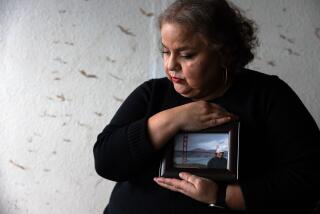Bataan Death March Survivor’s U.S. Citizenship Revoked : Bureaucratic Error Leaves Filipino ‘Homeless’
- Share via
Gregorio Calantas Rivera was a soldier for the Republic of the Philippines before he served six years as a lieutenant in the U.S. Army during World War II. But today he is a citizen of neither country.
A native-born Filipino, Rivera renounced his Filipino citizenship in November, when U.S. District Judge Gordon Thompson administered an oath that declared Rivera a U.S. citizen based on his service to this country.
However, two months later, Rivera was asked to voluntarily give up his American citizenship because officials of the Immigration and Naturalization Service had made a mistake and allowed him to become a citizen under a law that did not apply to him.
When Rivera refused to relinquish his American citizenship, Thompson ordered it revoked in January.
Today, Rivera will once again go before Thompson to plead his case and ask to be granted citizenship in the country for which he fought and was held as a prisoner of war by Japanese soldiers.
‘Man Without a Country’
“He is literally today a man without a country,” said Gregory Knoll, director of Legal Aid Society of San Diego, the agency representing Rivera. “He fought for us and survived the Bataan Death March,” a 55-mile march to prison camps during which about 10,000 American and Filipino prisoners of war died at the hands of Japanese soldiers.
Although the INS takes full responsibility for the mistake, INS attorney Alan Rabinowitz said, no one has been able to find another special section of law under which to approve Rivera’s citizenship. Rivera now has to reapply and be put on a waiting list like other Filipinos--a process that could take years, Rabinowitz said.
“It’s a very rare situation,” Rabinowitz said. “I have never had to do that before. It was very unfortunate. It was based on an error, our error.”
The INS incorrectly processed Rivera’s citizenship application under a law that applies to U.S. servicemen from some countries--but not the Philippines.
Vowed to Continue Fight
Rivera, 68, said he is angry at the decision to revoke his U.S. citizenship and vowed to continue the fight.
“We have been brought up and taught the American way of life,” he said. “Sometimes I feel naturally frustrated, disappointed and even angry. I will continue to fight for my case in appeal.”
Rivera said he came to America as a visitor in August, 1982, and decided to apply for citizenship because he wanted to take advantage of all of the things in America that he believes he is entitled to.
He said he and his wife, Baciencia, live in San Diego with a daughter who married an American in the U.S. Navy. He said he helps support the family by working in grape vineyards in Northern California.
Can’t Return to Philippines
The couple also have 12 children in the Philippines, and Rivera said he cannot visit them because he renounced his Philippine citizenship when he took the American oath, and his passport is no longer valid.
Knoll said he believes Rivera’s citizenship should be reinstated immediately because the INS made the mistake, not Rivera.
“I think it’s outrageous, a shame and embarrassment to this country,” he said. “They (INS) tend not to think of the human tragedy their decisions cause.”
If Rivera wins the appeal, Knoll said, the Legal Aid Society will request that he be re-administered the oath in the courtroom on the same day.
More to Read
Sign up for Essential California
The most important California stories and recommendations in your inbox every morning.
You may occasionally receive promotional content from the Los Angeles Times.













